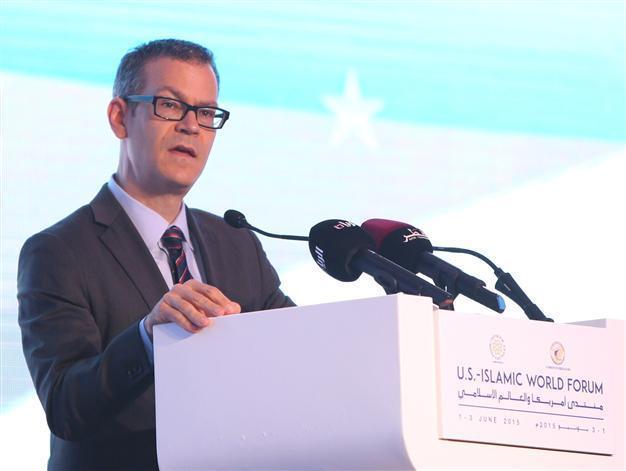Nuclear deal will reduce Iran enrichment capacity: US adviser
DOHA - Agence France-Presse

US National Security Adviser, Colin Kahl, delivers a speech during a panel discussion as part of the US-Islamic World Forum on June 1, 2015 in the Qatari capital Doha. AFP Photo
A nuclear deal with Iran will significantly reduce Tehran's enrichment capacity, US Vice-President Joe Biden's national security adviser told a conference in Qatar on June 1.
Dr Colin H. Kahl, speaking at the US-Islamic World Forum in Doha, said the current deal being hammered out was the best on offer, despite many sceptical voices in the US and elsewhere, including Gulf Arab states.
"Under the deal we are negotiating... Iran's enrichment capability will be substantially rolled back," said Kahl.
"The deal we are negotiating makes us and the region safer."
The ongoing talks to finalise a nuclear accord between Iran and world powers, including the United States, are deadlocked weeks ahead of a deadline.
Negotiations at the weekend in Geneva, Switzerland, failed to bridge differences between Washington and Tehran, especially over the crucial issue of inspections of military sites.
Other sticking points remain, including the possible military dimensions of the Iranian nuclear programme and the demands by the P5+1 group for UN inspections of Iranian military bases.
A deadline has been set for June 30 to reach a ground-breaking agreement that would see Iran curtail its nuclear ambitions in return for a lifting of crippling international sanctions.
After three decades of enmity, any accord would pave the way to bringing Iran back into the international fold and potentially create fresh impetus to resolve a host of conflicts in the Middle East.
On April 2, Iran and the "P5+1" -- as the US and its partners are known -- agreed to the main outlines of a nuclear deal, with Tehran agreeing to rein in and mothball large sections of its atomic programme.
But differences remain, with both the United States and Iran under immense pressure from hardliners not to make major concessions.
Since the April 2 accord, technical experts have been meeting behind the scenes to overcome the remaining issues. But many of the decisions now need to be made at a political level.
Following talks last weekend, US Secretary of State John Kerry broke a leg while cycling but advisers said the accident would not slow the globe-trotting diplomat.
Kahl said on June 1 that "today" it would take Iran two-to-three months to produce enough fissile material for one bomb.
But despite criticism he said a negotiated settlement was the best solution.
"In the absence of comprehensive agreement to deal with this challenge and constrain Iran's programme, Iran would likely install and begin operating tens of thousands of fissile centrifuges in the near future," he added.
The forum is a three-day long conference involving politicians, policy advisers and academics from across the Middle East and the United States.
